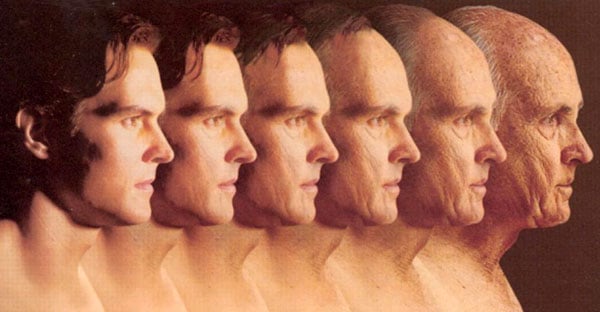Sign up to Get FREE Steroids, SARMS, Peptides eBooks
[sc:masthead-std]
[sc:salutation-std]
Wrinkles, decreased brain function and gray hair are looked at as an acceptable part of aging. However, these problems may be a thing of the past since scientists at the Dana-Farber Cancer Institute recently discovered a medical breakthrough that can reverse aging.
I don’t know about you, but growing older scares me to death! After all, who wants to develop joint problems, lose libido, produce less testosterone and develop a wrinkly face that says to all of the hotties, “I’m no longer a sexual option for you.”
It’s a pretty rhetorical question since I’m sure that none of you enjoy the thought of aging. But the sad thing is that no matter if you’re 20 years old or 45 years old, we all are slowly advancing down the old age tunnel.

So is there any sign of encouragement that can comfort us in regards to aging? Well at first I didn’t think so... until I recently heard on the Brian Lehrer Show that scientists may have developed an amazing breakthrough that can actually reverse the aging process! Here are the details on what happened during the show.
 George Spellwin's newest guide, Chemical Wizardry contains the latest inside information to make your body explode with strength, definition, and unthinkable new muscle mass. [click here to read more...] |
Breakthrough Reverse Aging Study
If you’re unaware of whom Brian Lehrer is, he’s an award-winning radio talk show host from New York City. Lehrer is also a former NBC anchorman who runs a two-hour daily show called “The Brian Lehrer Show.” On the latest episode of his show, Lehrer featured Dr. Ronald A. DePinho from the Dana-Farber Cancer Institute; DePinho is also Professor of Medicine at the Harvard Medical Institute.
The reason why DePinho was on the show is because his team recently conducted a major study on the aging process. DePinho wanted to study the effects of what manipulating an enzyme called telomerase would do to DNA sequencing (telomerase was discovered just last year). Seeing as how many of the nasty aging side effects are related to “excessive DNA damage,” as DePinho put it, manipulating telomerase was bound to have some effect on the aging process.
After being introduced on the show, DePinho went into detail about the experiment by saying, “What we did in this study was to engineer mice with a telomerase gene that could be toggled on and off in an artificial way. And the ‘off’ state, as you described, these mice were very aged, they aged very rapidly, they had shortened life spans, they manifested many signs of advanced age like impaired brain function, gray hair, organ atrophy, infertility and so on.”
DePinho further described the study by saying, “And what we did with these mice, with these entrenched degenerative disease, we flipped the telomerase gene back on. And frankly what we were expecting was slowly or stabilization of the aging process, and instead, we witnessed a dramatic reversal in the signs and symptoms of aging.”
So what exactly were the signs of aging that were reversed? DePinho shed some light on this by adding, “The shrunken brains were increased back near normal, cognitive functions improved.” He also added, “The coat hair was restored to a healthy sheen, and fertility was also restored. If you look, for example, in the testes of these animals, the sperm was very under populated in these animals, virtually almost no sperm left in the testes. And after just one month of turning this gene back on and erasing the underlying cause, what we found was that the cellularity returned, and the fertility of these animals were also restored.”
As you can see, just by manipulating one enzyme, DePinho and his team were able to produce some pretty amazing results on the mice. But where do the results of this study rank in regards to the history of anti-aging studies?
Groundbreaking Results
After hearing all of this, Lehrer made the following observation, “So when you take all of these things together, it sounds extremely dramatic. I mean it’s not quite Benjamin Button, but maybe it’s not that far off.”
This prompted DePinho to mention just how groundbreaking this study was as he said, “Well it certainly is the first time that an aged state equivalent to what might be seen in a human in their 8th and 9th decade of life has been reversed in an animal.”
And while it’s just mice, the fact that DePinho and his team are the first to reverse aging in animals is incredible! However, you still have to wonder if this study means that we’re any closer to producing the same results in humans.
How does DePinho’s Study impact Humans?
Even with the amazing results from DePinho’s study, you wouldn’t guess that we’re close to replicating the same results in humans.
Interestingly enough though, DePinho believes that we are somewhat closer as he said, “The implications for humans, obviously we have a lot more research to do, but many of the basic observations that we’ve made in genetically engineered mice have directly illuminated a path towards translational efforts or clinical efforts in a human situation.”
Lehrer was pretty interested in learning more about how this study impacted humans as he asked, “How could this one day be used in humans? It sounds like these mice were, in the first place, bred to age extremely rapidly. So with humans that are genetically average, is there a way to get in there and, you know, repair the telomeres?”
DePinho answered by saying, “The aging process is very complicated. There are many factors that collectively cooperate... many co-conspirators that actually lead to diminished health in your advanced years.” The co-conspirators that DePinho mentioned include mitochondria and proteins, and he said we need to understand all of these factors to truly get the “Ponce de Leon result people would hope for.”
However, DePinho also went on to point out that, “There is excellent epidemiologic evidence in humans that damaged telomeres, those with the most damage or erosion of telomeres at the tips, that that is linked to increased incidence of certain age-related diseases.”
And this brings us to another fascinating part of the show...
Curing Cancer and Other Diseases
As we all know, there is no real cure for cancer. But the findings of DePinho’s study could possibly put us on the right path towards curing cancer and even other diseases.
DePinho discussed the impact of his study on common age-related diseases by saying, “Those with the shortest, most damaged telomeres have an increased incidence of cancer, cardiovascular disease, Alzheimer’s, diabetes. And so one could speculate that if we could reawaken this enzyme in cells, even transcendentally, that it would wipe out damage and reset the degenerative potential of tissues and lead to increased years of healthy living.”
So not only do the results of this study support evidence for curing age-related side effects, but also the diseases that eventually kill many people. But is this really a trail that we want to head down?
Cheating Death
There are almost 6.9 billion people on Earth. With the population growing at around 1% every year, we should reach over 7 billion people within a couple of years. And as we all know, there are only so many resources to accommodate all of these people. So you really have to wonder if cheating aging, and possibly death, is a solution to a problem or the means to an even bigger one.
Of course, I’m not trying to be insensitive here because I feel bad for anyone with a life-threatening disease such as cancer or cardiovascular problems. And if Dr. DePinho’s research leads to better treatments for these diseases, then I’m all for it. I also love the idea of being able to live a healthier, wrinkle-free life such as the aged mice in the DePinho’s study.
So far, DePinho isn’t sure if his research has any effect on extending a person’s life span as he said, “Our study did not address the longevity issue.” He also answered ‘yes’ when Lehrer asked him if the study only concluded that the mice would have the same lifespan only in a healthier body.
And of course anabolic steroids and such have been great for anti-aging and have been around for years. I hope I live to see if manipulating the telomerase gene will be a further improvement.
Here's some related links to discuss this on the EliteFitness.com Forums:
Telomerase: Say Goodbye To Aging
Poll: When will the human race defeat the aging process?
Poll: Would you want to live forever?
And here's a link to the EliteFitness.com Life Extension, Andropause & Masters Bodybuilding discussion forum.





